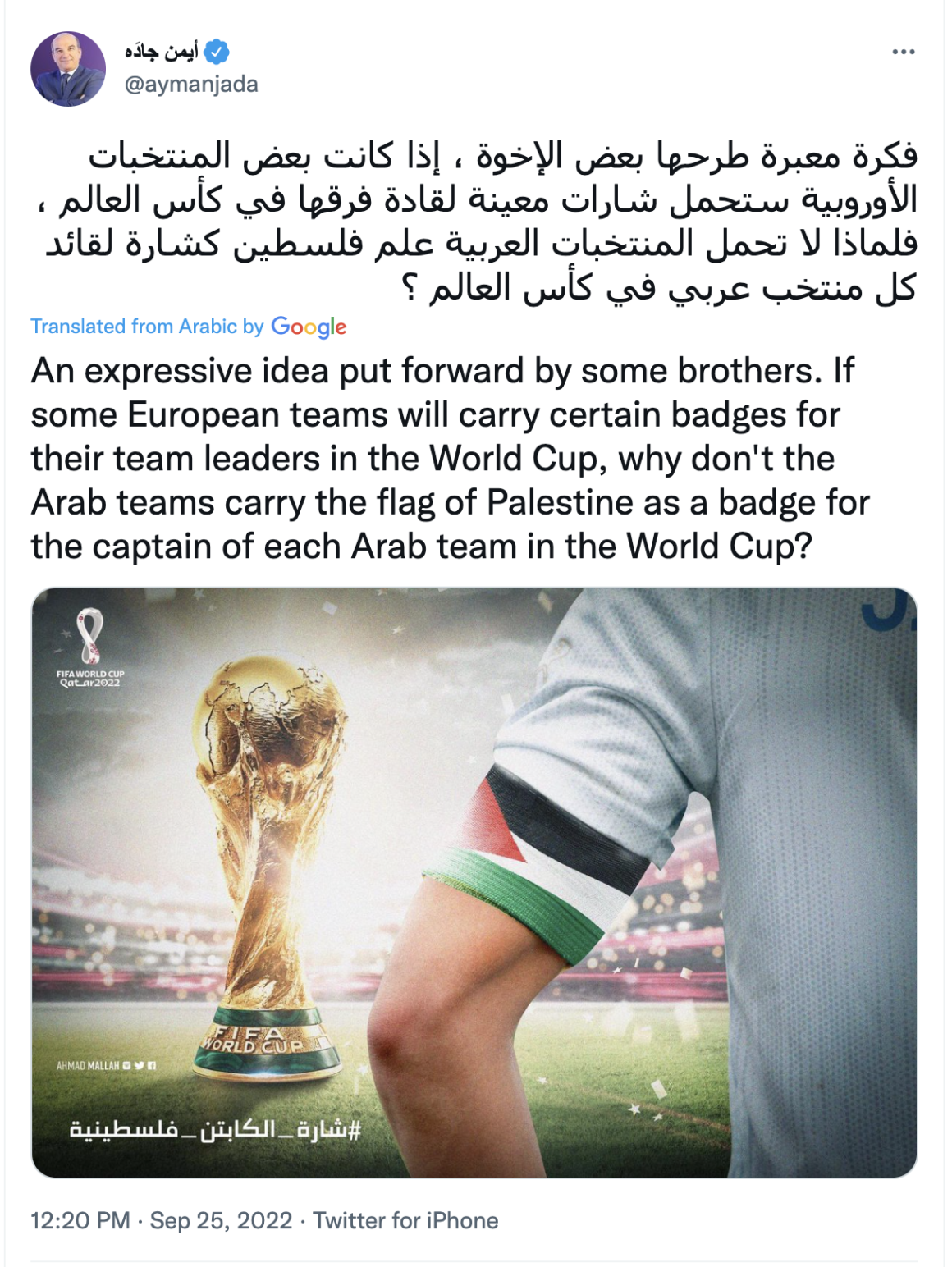Social media users have called on Arab football team captains to wear special armbands in the colours of the Palestinian flag at the 2022 FIFA World Cup in Qatar in November.
The hashtag “#شارة_الكابتن_فلسطينية, or ‘the captain’s armband’ trended on Twitter in response to some European teams’ plans to wear armbands in support of Ukraine and LGBTQIA+ rights.
Armbands are among the most recent and prominent symbolic methods used by players to showcase their support for causes, and has recently been used to call out Qatar for its treatment of migrant workers.
England, alongside nine other European nations, recently announced it will support a new ‘One Love’ campaign promoting ‘inclusion and equality’ at this year’s World Cup in Qatar.
The initiative, created by the Netherlands, will also be supported by Belgium, Denmark, France, Germany, Norway, Sweden, Switzerland and Wales, aiming to “send a message against discrimination of any kind as the eyes of the world fall on the global game,” the English Football Association (FA) said in a statement on Wednesday.
Meanwhile, Robert Lewandowski, the captain of the Polish national team announced that he intends to wear a leadership armband bearing the flag of Ukraine—a gift from Ukrainian football legend Andrei Shevchenko— to raise awareness about the Russian war in Ukraine at the World Cup.
Users are demanding Arab teams also wear leadership badges bearing the Palestinian flag, to express their solidarity with the Palestinian cause and denounce the West’s double standards in sports.

Ayman Jada, who has over a million followers on Twitter, and other sports commentators and analysts strongly supported the idea of changing the armbands for the Arab teams that are anticipated to compete in the 2022 FIFA World Cup.
“If some European teams will carry certain badges for their team leaders in the coming World Cup, why don’t the Arab teams carry the flag of Palestine as an armband for their captains during World Cup football games,?” Jada’s tweet read.
FIFA rules currently forbid teams from bringing their own armband designs to the World Cup and require them to use equipment provided by FIFA, and the federation has not confirmed if leaders of European teams will be allowed to wear the armbands that they announced.
FIFA’s double standards
In the past, footballer have taken political stances supported by FIFA, including taking a knee after the death of George Floyd, a Black man killed by a police officer in the United States. However, online users criticised FIFA’s hypocrisy when it comes to Palestine.
“What if all Arab teams decide to put the flag of Palestine, will it still be a political matter that should be separated from football,” one user said, calling out the double standards of FIFA when it comes to supporting Palestine.
FIFA is one of the organisations that joined the West’s anti-Russian regulations in response to Moscow’s invasion of Ukraine on February 24.
However, the global footballing body has not denounced Israel’s occupation of Palestine, despite the numerous documented instances of Israel deliberately targeting Palestinian stadiums, restricting athletes’ travel, cancelling sporting events, and even arresting and killing Palestinian footballers.
In March 2022, Palestinian player Mohammed Rashid spoke out on his decision to not stand behind a ‘Stop War’ banner protesting the ongoing Russian War on Ukraine, stating that it is double standards.
“I didn’t want to stand because there is no fairness in it,” Rashid told GOAL. “Obviously I do not support the war that is happening in Ukraine – I do not support Russia, I don’t support any of this stuff. I’m against all types of wars, I’m against all types of violence.
“But for me to stand behind a Stop War banner when it comes to a war that’s happening in Europe, when we tried to do the same thing [with] all the wars that have happened over the years in Palestine, and they tell us that we cannot do that, that it is illegal, that it is against FIFA rules, and that it is mixing football and politics, and all these things… it is just a matter of justice and fairness.”
In response to a Palestinian request in 2017 that the six Israeli football clubs based in illegal settlements in the occupied Palestinian territories either relocate to Israel or be barred from FIFA-recognised competitions, the FIFA council stated unequivocally that sports and politics should not be mixed.
“The FIFA Council acknowledges that the current situation (in Palestine and Israel) is, for reasons that have nothing to do with football, characterized by an exceptional complexity and sensitivity and by certain de facto circumstances that can neither be ignored nor changed unilaterally by non-governmental organisations such as FIFA.”
Two years later, Israel callously cancelled the FIFA Palestine Cup that was meant to bring Gaza’s top football team, Khadamat Rafah Club, and the West Bank’s FC Balata together in a dramatic final.
In 2019, Israel essentially cancelled the Palestine Cup by denying Gazan players travel permits. This has been highlighted by rights groups as just one example of various flagrant human rights abuses committed by the occupying state in an effort to isolate Palestinians both at home and abroad.
Israel’s restrictions on the movement of Palestinians are highly repressive, with at least 700 obstacles placed around the West Bank and up to 140 checkpoints.
Palestinians and activists from all around the world have long accused FIFA of ignoring letters to suspend the Israeli Football Association’s membership.







